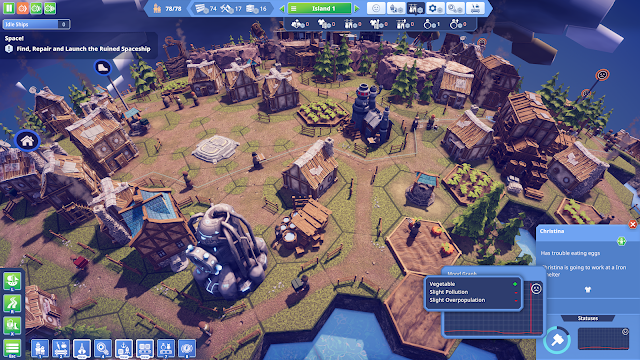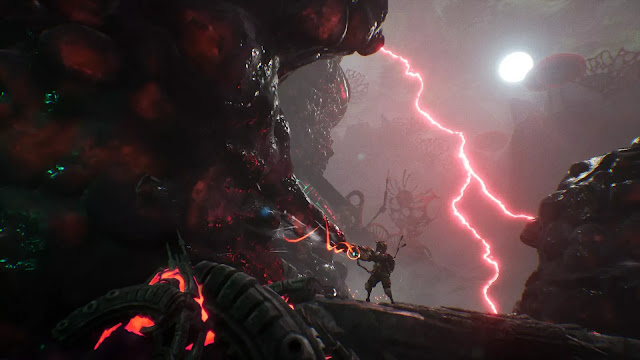Before We Leave
Week of 11 May
What is the point of a strategy game? To defeat an enemy or competitor? There’s no sign of these in Sim City? To complete the game? Again, Will Wright’s city-building classic is helpful; you can play SimCity for as long as you have patience. Perhaps it’s about optimisation and expansion. I spent far too many hours playing Transport Tycoon Deluxe with my only objective (I turned off the terrible AI) being to grow and improve my transport (read train) network.
Before We Leave scratches this itch. It markets itself as a “non-violent city building game”. There are no real enemies (apparently there are, later in the game, mild opportunities for conflict, but they seem fairly trivial). There is an objective of sorts – rebuild civilisation and leave your starting planet, but it’s never pressed upon you too hard.
What is the point of a strategy game? To defeat an enemy or competitor? There’s no sign of these in Sim City? To complete the game? Again, Will Wright’s city-building classic is helpful; you can play SimCity for as long as you have patience. Perhaps it’s about optimisation and expansion. I spent far too many hours playing Transport Tycoon Deluxe with my only objective (I turned off the terrible AI) being to grow and improve my transport (read train) network.
Before We Leave scratches this itch. It markets itself as a “non-violent city building game”. There are no real enemies (apparently there are, later in the game, mild opportunities for conflict, but they seem fairly trivial). There is an objective of sorts – rebuild civilisation and leave your starting planet, but it’s never pressed upon you too hard.
There’s a quiet melancholy to the world. Citizens emerge
from an underground bunker where they’ve waited out some kind of disaster. The
vestiges of tower blocks, oil and technologies hint at something that went very
wrong, and the music has a sometimes mournful edge to it, but all of this is,
again, played gently and in general the game is one of creating a new village,
then villages and then leaving this planet for others. The message of
rebuilding after a disaster is oddly resonant now.
The game functions according to several genre norms – there are resource prerequisites (so a woodcutter requires only wood, which can be harvested manually from forests), but later buildings require several different materials. All buildings must connect with a road, à la Frostpunk, although Before We Leave never seems to be as constricting as other games, its hexagonal grid easy to use.
The visuals are clean and easy to understand, with bright colours again calling back to happier games. It’s not a technical masterpiece, and it’s a shame that on my laptop even with resolution and settings knocked down a fair few notches it still struggles to maintain a decent frame rate. This isn’t a big deal, and I don’t know if this is just Unity being a less performant toolkit that, say, Unreal Engine, the developers understandably deploying their scarce time on more useful improvements or my technical ineptitude.
The game generally explains what you can do and what is required well, although some elements are a little less well baked. The different colours of research (red, green and purple) jar a little in a game which otherwise is grounded in real resources. The overpopulation mechanic had me confused: I assumed I’d provided too few houses, but instead overpopulation is used to show (regardless of island size) that too many people live there. To the developers’ great credit, they’ve explored this issue with the community, listened and are fixing it.
Before We Leave’s warm colours, pleasing development of settlements and onward progress in no particular hurry make it a relaxing game, especially for now. Its lack of complexity stands in its favour. Take it for a trip
Developer: Balancing Monkey Games
Platform: PC
Price paid: £15.99 (Before We Leave latest price)
The game functions according to several genre norms – there are resource prerequisites (so a woodcutter requires only wood, which can be harvested manually from forests), but later buildings require several different materials. All buildings must connect with a road, à la Frostpunk, although Before We Leave never seems to be as constricting as other games, its hexagonal grid easy to use.
The visuals are clean and easy to understand, with bright colours again calling back to happier games. It’s not a technical masterpiece, and it’s a shame that on my laptop even with resolution and settings knocked down a fair few notches it still struggles to maintain a decent frame rate. This isn’t a big deal, and I don’t know if this is just Unity being a less performant toolkit that, say, Unreal Engine, the developers understandably deploying their scarce time on more useful improvements or my technical ineptitude.
The game generally explains what you can do and what is required well, although some elements are a little less well baked. The different colours of research (red, green and purple) jar a little in a game which otherwise is grounded in real resources. The overpopulation mechanic had me confused: I assumed I’d provided too few houses, but instead overpopulation is used to show (regardless of island size) that too many people live there. To the developers’ great credit, they’ve explored this issue with the community, listened and are fixing it.
Before We Leave’s warm colours, pleasing development of settlements and onward progress in no particular hurry make it a relaxing game, especially for now. Its lack of complexity stands in its favour. Take it for a trip
Developer: Balancing Monkey Games
Platform: PC
Price paid: £15.99 (Before We Leave latest price)




Comments
Post a Comment